University Assignment: Legal & Ethical Analysis of Taylah's Case Study
VerifiedAdded on 2023/03/20
|10
|3062
|75
Essay
AI Summary
This essay presents a comprehensive analysis of a case study involving Taylah, a 14-year-old adolescent seeking contraception at a sexual health clinic. The essay delves into the ethical and legal considerations for nursing professionals in this scenario, referencing the assessment brief for NURBN 1001. It explores the legal aspects, including the age of consent, privacy laws, and the importance of informed consent, considering the patient's capacity to understand the implications of her decisions. Furthermore, the essay meticulously examines ethical principles, particularly autonomy, beneficence, and non-maleficence, and their application in providing patient-centered care. It discusses the need to respect Taylah's autonomy, promote her well-being by addressing her risky behaviors, and avoid any actions that could cause her harm, considering her diabetes and lifestyle choices. The essay also includes a discussion on the importance of building trust and providing education to support Taylah's health and well-being, and how nurses can navigate the ethical and legal complexities of the situation.
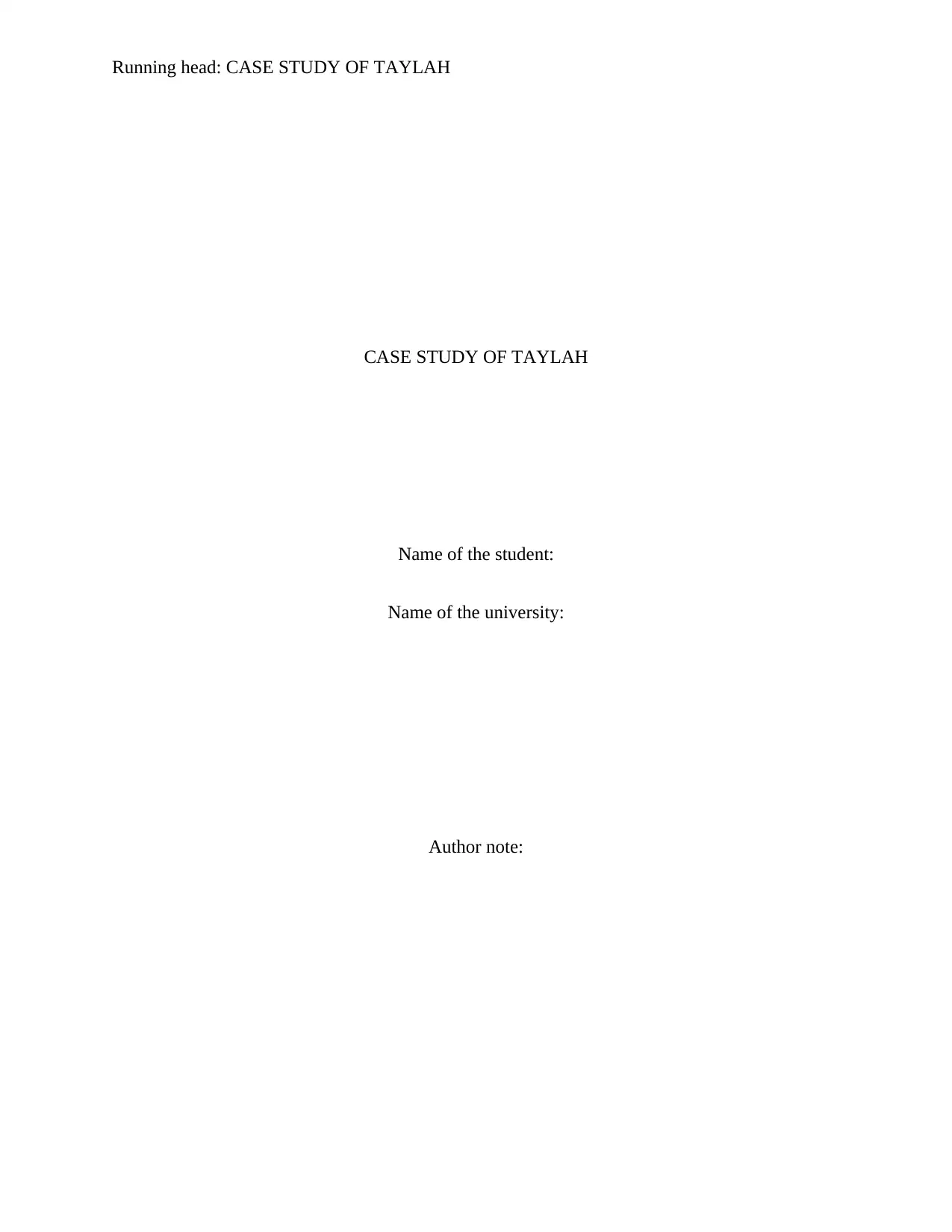
Running head: CASE STUDY OF TAYLAH
CASE STUDY OF TAYLAH
Name of the student:
Name of the university:
Author note:
CASE STUDY OF TAYLAH
Name of the student:
Name of the university:
Author note:
Paraphrase This Document
Need a fresh take? Get an instant paraphrase of this document with our AI Paraphraser
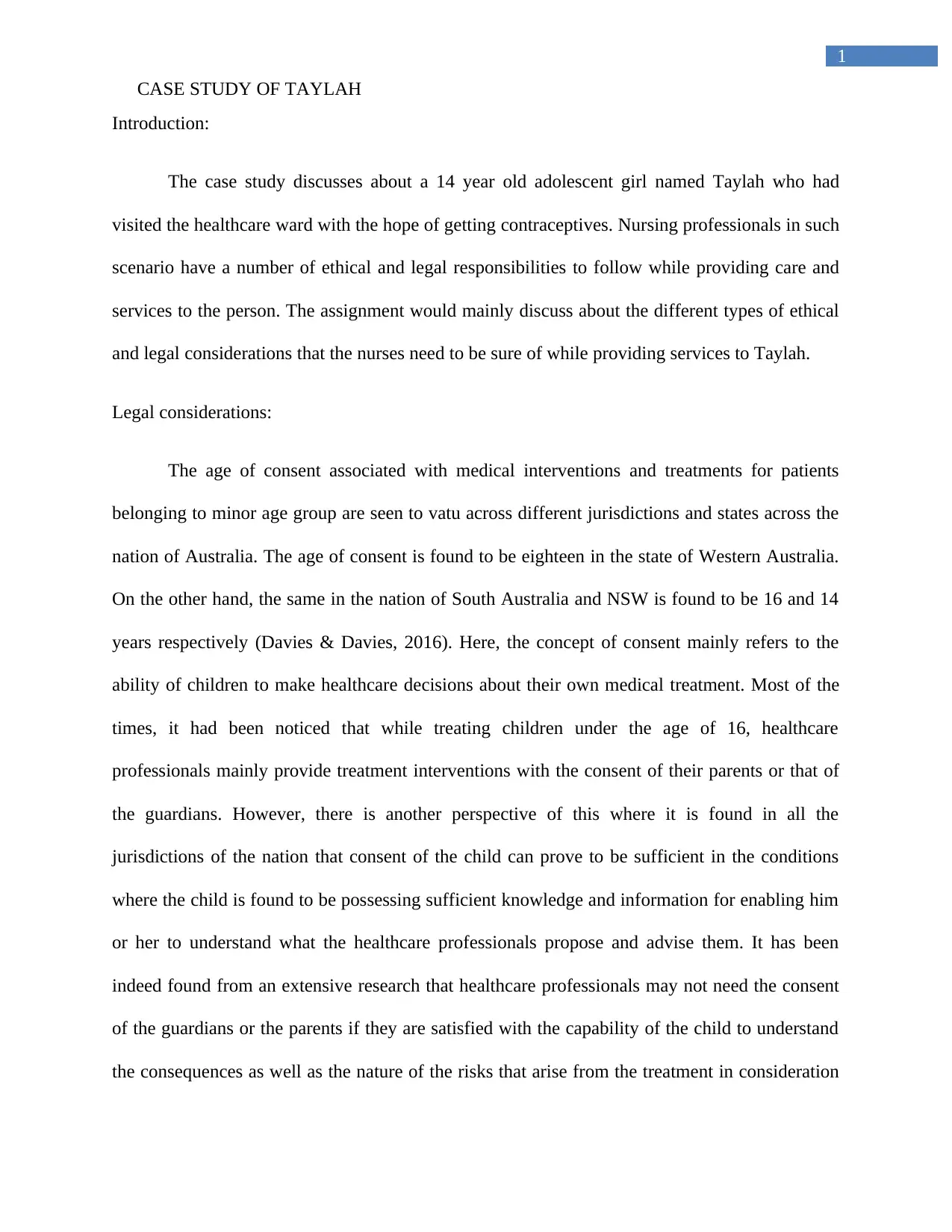
1
CASE STUDY OF TAYLAH
Introduction:
The case study discusses about a 14 year old adolescent girl named Taylah who had
visited the healthcare ward with the hope of getting contraceptives. Nursing professionals in such
scenario have a number of ethical and legal responsibilities to follow while providing care and
services to the person. The assignment would mainly discuss about the different types of ethical
and legal considerations that the nurses need to be sure of while providing services to Taylah.
Legal considerations:
The age of consent associated with medical interventions and treatments for patients
belonging to minor age group are seen to vatu across different jurisdictions and states across the
nation of Australia. The age of consent is found to be eighteen in the state of Western Australia.
On the other hand, the same in the nation of South Australia and NSW is found to be 16 and 14
years respectively (Davies & Davies, 2016). Here, the concept of consent mainly refers to the
ability of children to make healthcare decisions about their own medical treatment. Most of the
times, it had been noticed that while treating children under the age of 16, healthcare
professionals mainly provide treatment interventions with the consent of their parents or that of
the guardians. However, there is another perspective of this where it is found in all the
jurisdictions of the nation that consent of the child can prove to be sufficient in the conditions
where the child is found to be possessing sufficient knowledge and information for enabling him
or her to understand what the healthcare professionals propose and advise them. It has been
indeed found from an extensive research that healthcare professionals may not need the consent
of the guardians or the parents if they are satisfied with the capability of the child to understand
the consequences as well as the nature of the risks that arise from the treatment in consideration
CASE STUDY OF TAYLAH
Introduction:
The case study discusses about a 14 year old adolescent girl named Taylah who had
visited the healthcare ward with the hope of getting contraceptives. Nursing professionals in such
scenario have a number of ethical and legal responsibilities to follow while providing care and
services to the person. The assignment would mainly discuss about the different types of ethical
and legal considerations that the nurses need to be sure of while providing services to Taylah.
Legal considerations:
The age of consent associated with medical interventions and treatments for patients
belonging to minor age group are seen to vatu across different jurisdictions and states across the
nation of Australia. The age of consent is found to be eighteen in the state of Western Australia.
On the other hand, the same in the nation of South Australia and NSW is found to be 16 and 14
years respectively (Davies & Davies, 2016). Here, the concept of consent mainly refers to the
ability of children to make healthcare decisions about their own medical treatment. Most of the
times, it had been noticed that while treating children under the age of 16, healthcare
professionals mainly provide treatment interventions with the consent of their parents or that of
the guardians. However, there is another perspective of this where it is found in all the
jurisdictions of the nation that consent of the child can prove to be sufficient in the conditions
where the child is found to be possessing sufficient knowledge and information for enabling him
or her to understand what the healthcare professionals propose and advise them. It has been
indeed found from an extensive research that healthcare professionals may not need the consent
of the guardians or the parents if they are satisfied with the capability of the child to understand
the consequences as well as the nature of the risks that arise from the treatment in consideration
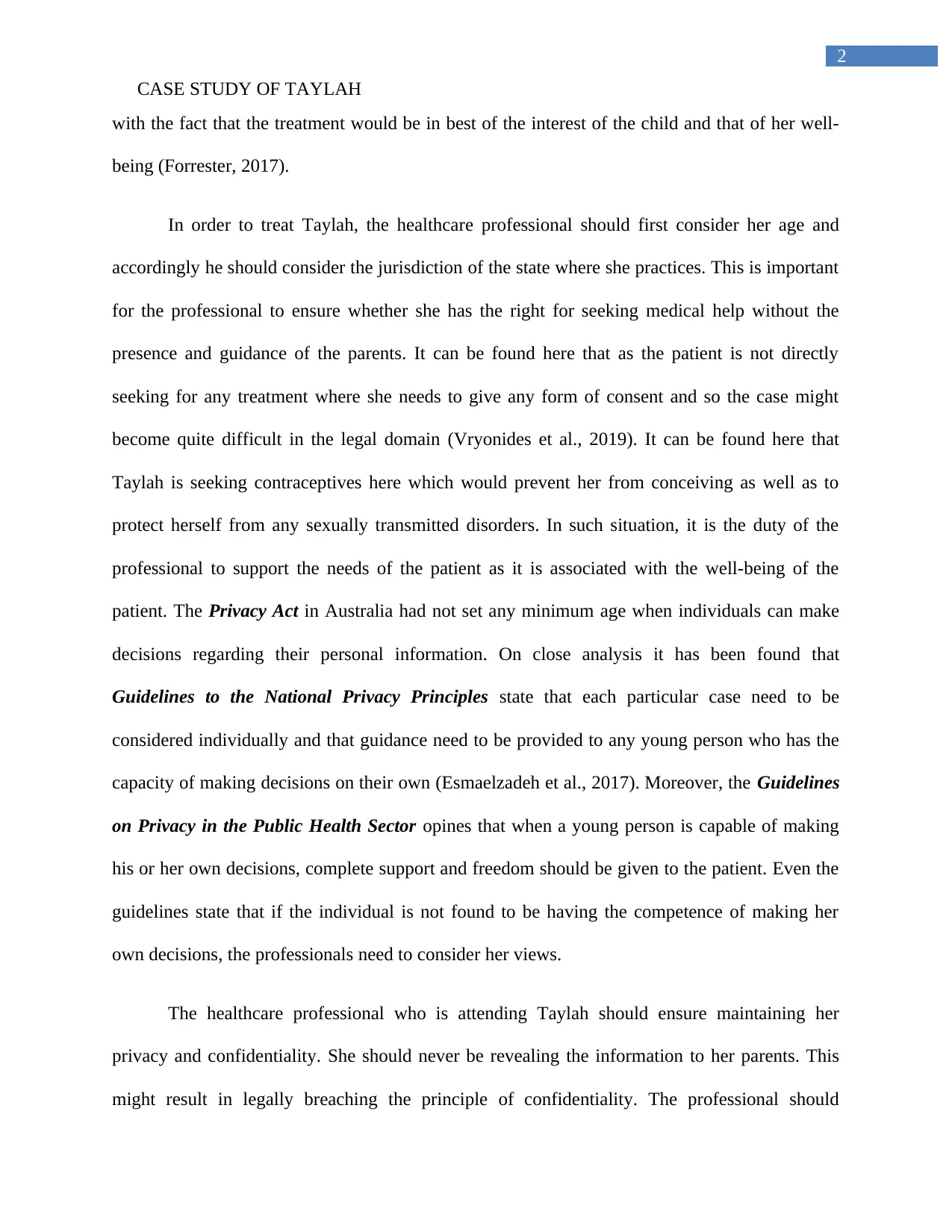
2
CASE STUDY OF TAYLAH
with the fact that the treatment would be in best of the interest of the child and that of her well-
being (Forrester, 2017).
In order to treat Taylah, the healthcare professional should first consider her age and
accordingly he should consider the jurisdiction of the state where she practices. This is important
for the professional to ensure whether she has the right for seeking medical help without the
presence and guidance of the parents. It can be found here that as the patient is not directly
seeking for any treatment where she needs to give any form of consent and so the case might
become quite difficult in the legal domain (Vryonides et al., 2019). It can be found here that
Taylah is seeking contraceptives here which would prevent her from conceiving as well as to
protect herself from any sexually transmitted disorders. In such situation, it is the duty of the
professional to support the needs of the patient as it is associated with the well-being of the
patient. The Privacy Act in Australia had not set any minimum age when individuals can make
decisions regarding their personal information. On close analysis it has been found that
Guidelines to the National Privacy Principles state that each particular case need to be
considered individually and that guidance need to be provided to any young person who has the
capacity of making decisions on their own (Esmaelzadeh et al., 2017). Moreover, the Guidelines
on Privacy in the Public Health Sector opines that when a young person is capable of making
his or her own decisions, complete support and freedom should be given to the patient. Even the
guidelines state that if the individual is not found to be having the competence of making her
own decisions, the professionals need to consider her views.
The healthcare professional who is attending Taylah should ensure maintaining her
privacy and confidentiality. She should never be revealing the information to her parents. This
might result in legally breaching the principle of confidentiality. The professional should
CASE STUDY OF TAYLAH
with the fact that the treatment would be in best of the interest of the child and that of her well-
being (Forrester, 2017).
In order to treat Taylah, the healthcare professional should first consider her age and
accordingly he should consider the jurisdiction of the state where she practices. This is important
for the professional to ensure whether she has the right for seeking medical help without the
presence and guidance of the parents. It can be found here that as the patient is not directly
seeking for any treatment where she needs to give any form of consent and so the case might
become quite difficult in the legal domain (Vryonides et al., 2019). It can be found here that
Taylah is seeking contraceptives here which would prevent her from conceiving as well as to
protect herself from any sexually transmitted disorders. In such situation, it is the duty of the
professional to support the needs of the patient as it is associated with the well-being of the
patient. The Privacy Act in Australia had not set any minimum age when individuals can make
decisions regarding their personal information. On close analysis it has been found that
Guidelines to the National Privacy Principles state that each particular case need to be
considered individually and that guidance need to be provided to any young person who has the
capacity of making decisions on their own (Esmaelzadeh et al., 2017). Moreover, the Guidelines
on Privacy in the Public Health Sector opines that when a young person is capable of making
his or her own decisions, complete support and freedom should be given to the patient. Even the
guidelines state that if the individual is not found to be having the competence of making her
own decisions, the professionals need to consider her views.
The healthcare professional who is attending Taylah should ensure maintaining her
privacy and confidentiality. She should never be revealing the information to her parents. This
might result in legally breaching the principle of confidentiality. The professional should
⊘ This is a preview!⊘
Do you want full access?
Subscribe today to unlock all pages.

Trusted by 1+ million students worldwide
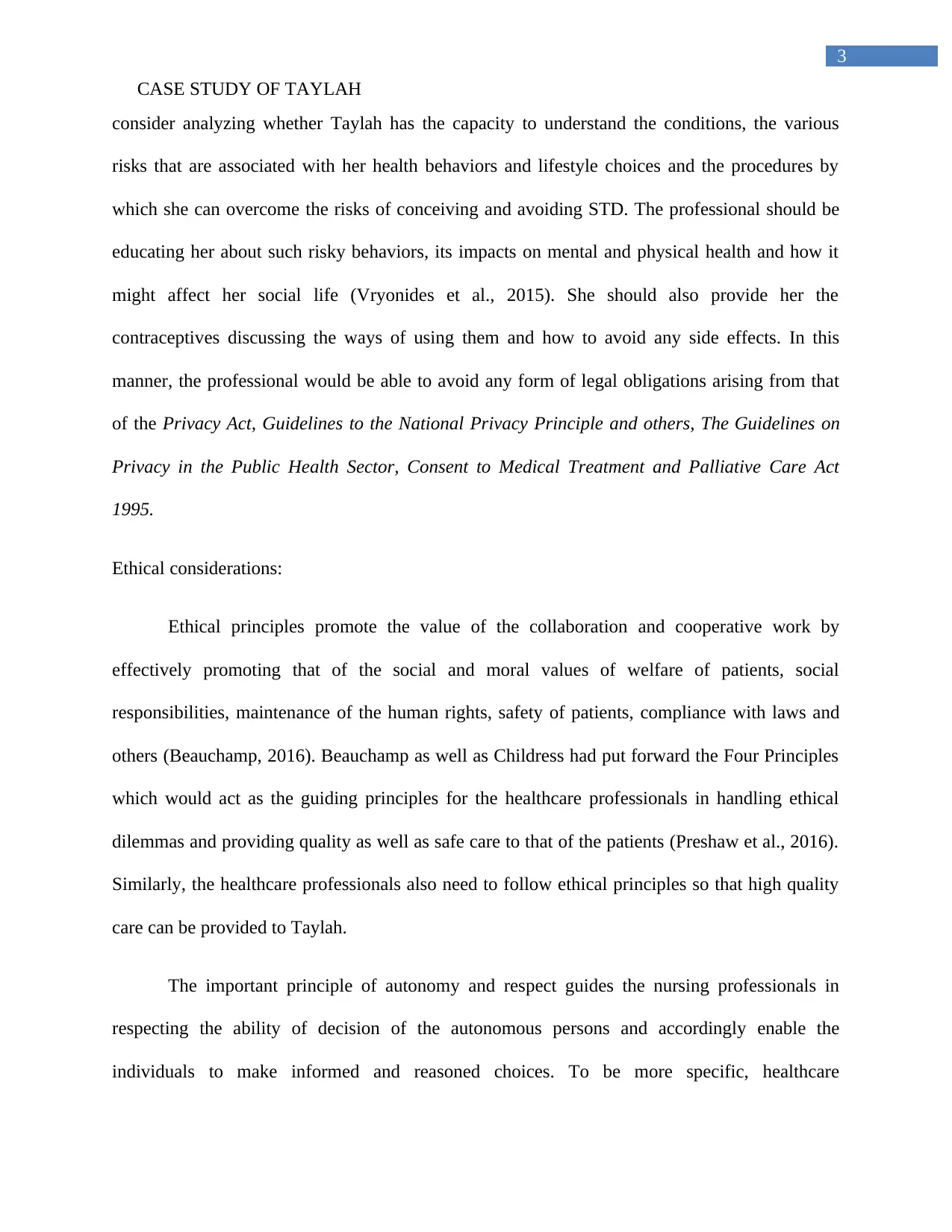
3
CASE STUDY OF TAYLAH
consider analyzing whether Taylah has the capacity to understand the conditions, the various
risks that are associated with her health behaviors and lifestyle choices and the procedures by
which she can overcome the risks of conceiving and avoiding STD. The professional should be
educating her about such risky behaviors, its impacts on mental and physical health and how it
might affect her social life (Vryonides et al., 2015). She should also provide her the
contraceptives discussing the ways of using them and how to avoid any side effects. In this
manner, the professional would be able to avoid any form of legal obligations arising from that
of the Privacy Act, Guidelines to the National Privacy Principle and others, The Guidelines on
Privacy in the Public Health Sector, Consent to Medical Treatment and Palliative Care Act
1995.
Ethical considerations:
Ethical principles promote the value of the collaboration and cooperative work by
effectively promoting that of the social and moral values of welfare of patients, social
responsibilities, maintenance of the human rights, safety of patients, compliance with laws and
others (Beauchamp, 2016). Beauchamp as well as Childress had put forward the Four Principles
which would act as the guiding principles for the healthcare professionals in handling ethical
dilemmas and providing quality as well as safe care to that of the patients (Preshaw et al., 2016).
Similarly, the healthcare professionals also need to follow ethical principles so that high quality
care can be provided to Taylah.
The important principle of autonomy and respect guides the nursing professionals in
respecting the ability of decision of the autonomous persons and accordingly enable the
individuals to make informed and reasoned choices. To be more specific, healthcare
CASE STUDY OF TAYLAH
consider analyzing whether Taylah has the capacity to understand the conditions, the various
risks that are associated with her health behaviors and lifestyle choices and the procedures by
which she can overcome the risks of conceiving and avoiding STD. The professional should be
educating her about such risky behaviors, its impacts on mental and physical health and how it
might affect her social life (Vryonides et al., 2015). She should also provide her the
contraceptives discussing the ways of using them and how to avoid any side effects. In this
manner, the professional would be able to avoid any form of legal obligations arising from that
of the Privacy Act, Guidelines to the National Privacy Principle and others, The Guidelines on
Privacy in the Public Health Sector, Consent to Medical Treatment and Palliative Care Act
1995.
Ethical considerations:
Ethical principles promote the value of the collaboration and cooperative work by
effectively promoting that of the social and moral values of welfare of patients, social
responsibilities, maintenance of the human rights, safety of patients, compliance with laws and
others (Beauchamp, 2016). Beauchamp as well as Childress had put forward the Four Principles
which would act as the guiding principles for the healthcare professionals in handling ethical
dilemmas and providing quality as well as safe care to that of the patients (Preshaw et al., 2016).
Similarly, the healthcare professionals also need to follow ethical principles so that high quality
care can be provided to Taylah.
The important principle of autonomy and respect guides the nursing professionals in
respecting the ability of decision of the autonomous persons and accordingly enable the
individuals to make informed and reasoned choices. To be more specific, healthcare
Paraphrase This Document
Need a fresh take? Get an instant paraphrase of this document with our AI Paraphraser
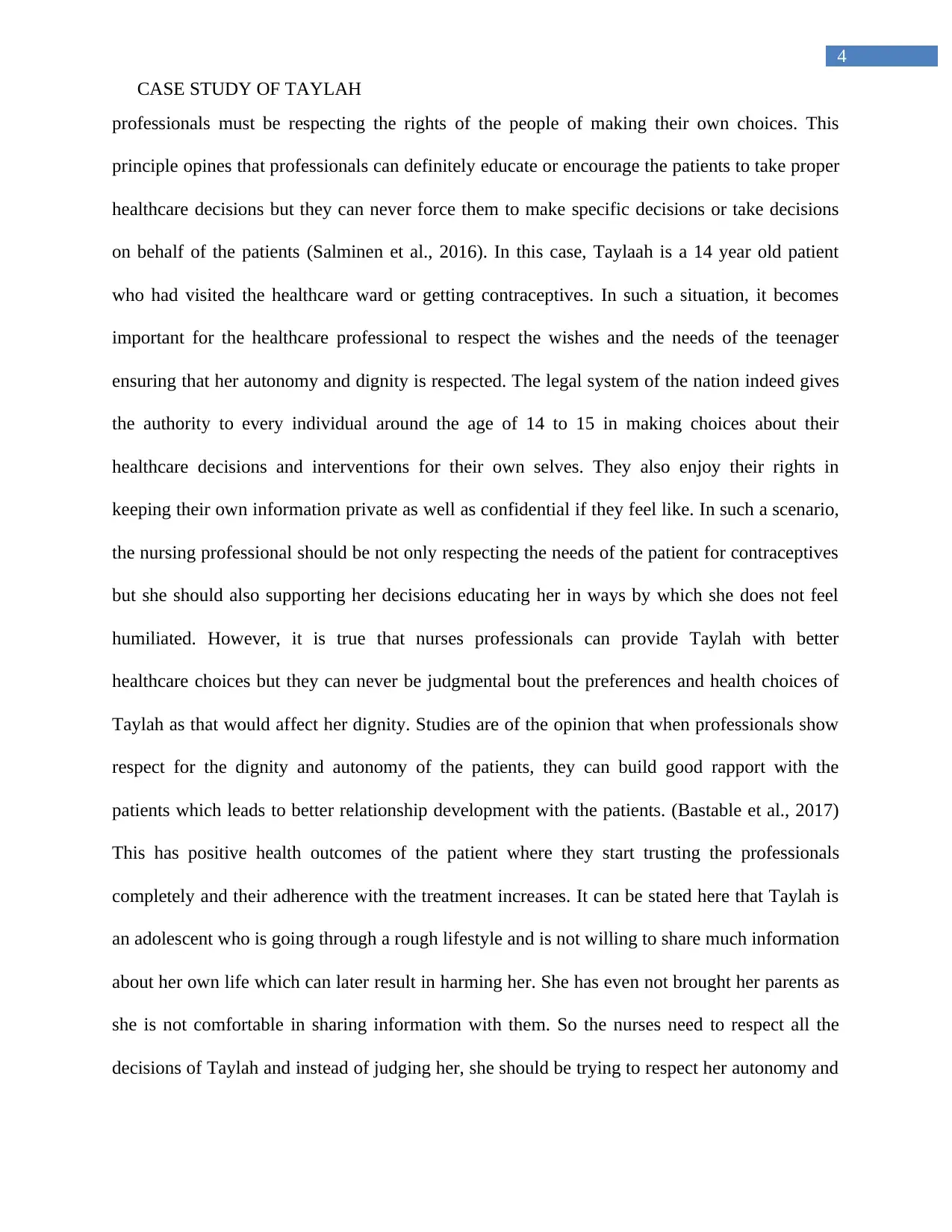
4
CASE STUDY OF TAYLAH
professionals must be respecting the rights of the people of making their own choices. This
principle opines that professionals can definitely educate or encourage the patients to take proper
healthcare decisions but they can never force them to make specific decisions or take decisions
on behalf of the patients (Salminen et al., 2016). In this case, Taylaah is a 14 year old patient
who had visited the healthcare ward or getting contraceptives. In such a situation, it becomes
important for the healthcare professional to respect the wishes and the needs of the teenager
ensuring that her autonomy and dignity is respected. The legal system of the nation indeed gives
the authority to every individual around the age of 14 to 15 in making choices about their
healthcare decisions and interventions for their own selves. They also enjoy their rights in
keeping their own information private as well as confidential if they feel like. In such a scenario,
the nursing professional should be not only respecting the needs of the patient for contraceptives
but she should also supporting her decisions educating her in ways by which she does not feel
humiliated. However, it is true that nurses professionals can provide Taylah with better
healthcare choices but they can never be judgmental bout the preferences and health choices of
Taylah as that would affect her dignity. Studies are of the opinion that when professionals show
respect for the dignity and autonomy of the patients, they can build good rapport with the
patients which leads to better relationship development with the patients. (Bastable et al., 2017)
This has positive health outcomes of the patient where they start trusting the professionals
completely and their adherence with the treatment increases. It can be stated here that Taylah is
an adolescent who is going through a rough lifestyle and is not willing to share much information
about her own life which can later result in harming her. She has even not brought her parents as
she is not comfortable in sharing information with them. So the nurses need to respect all the
decisions of Taylah and instead of judging her, she should be trying to respect her autonomy and
CASE STUDY OF TAYLAH
professionals must be respecting the rights of the people of making their own choices. This
principle opines that professionals can definitely educate or encourage the patients to take proper
healthcare decisions but they can never force them to make specific decisions or take decisions
on behalf of the patients (Salminen et al., 2016). In this case, Taylaah is a 14 year old patient
who had visited the healthcare ward or getting contraceptives. In such a situation, it becomes
important for the healthcare professional to respect the wishes and the needs of the teenager
ensuring that her autonomy and dignity is respected. The legal system of the nation indeed gives
the authority to every individual around the age of 14 to 15 in making choices about their
healthcare decisions and interventions for their own selves. They also enjoy their rights in
keeping their own information private as well as confidential if they feel like. In such a scenario,
the nursing professional should be not only respecting the needs of the patient for contraceptives
but she should also supporting her decisions educating her in ways by which she does not feel
humiliated. However, it is true that nurses professionals can provide Taylah with better
healthcare choices but they can never be judgmental bout the preferences and health choices of
Taylah as that would affect her dignity. Studies are of the opinion that when professionals show
respect for the dignity and autonomy of the patients, they can build good rapport with the
patients which leads to better relationship development with the patients. (Bastable et al., 2017)
This has positive health outcomes of the patient where they start trusting the professionals
completely and their adherence with the treatment increases. It can be stated here that Taylah is
an adolescent who is going through a rough lifestyle and is not willing to share much information
about her own life which can later result in harming her. She has even not brought her parents as
she is not comfortable in sharing information with them. So the nurses need to respect all the
decisions of Taylah and instead of judging her, she should be trying to respect her autonomy and
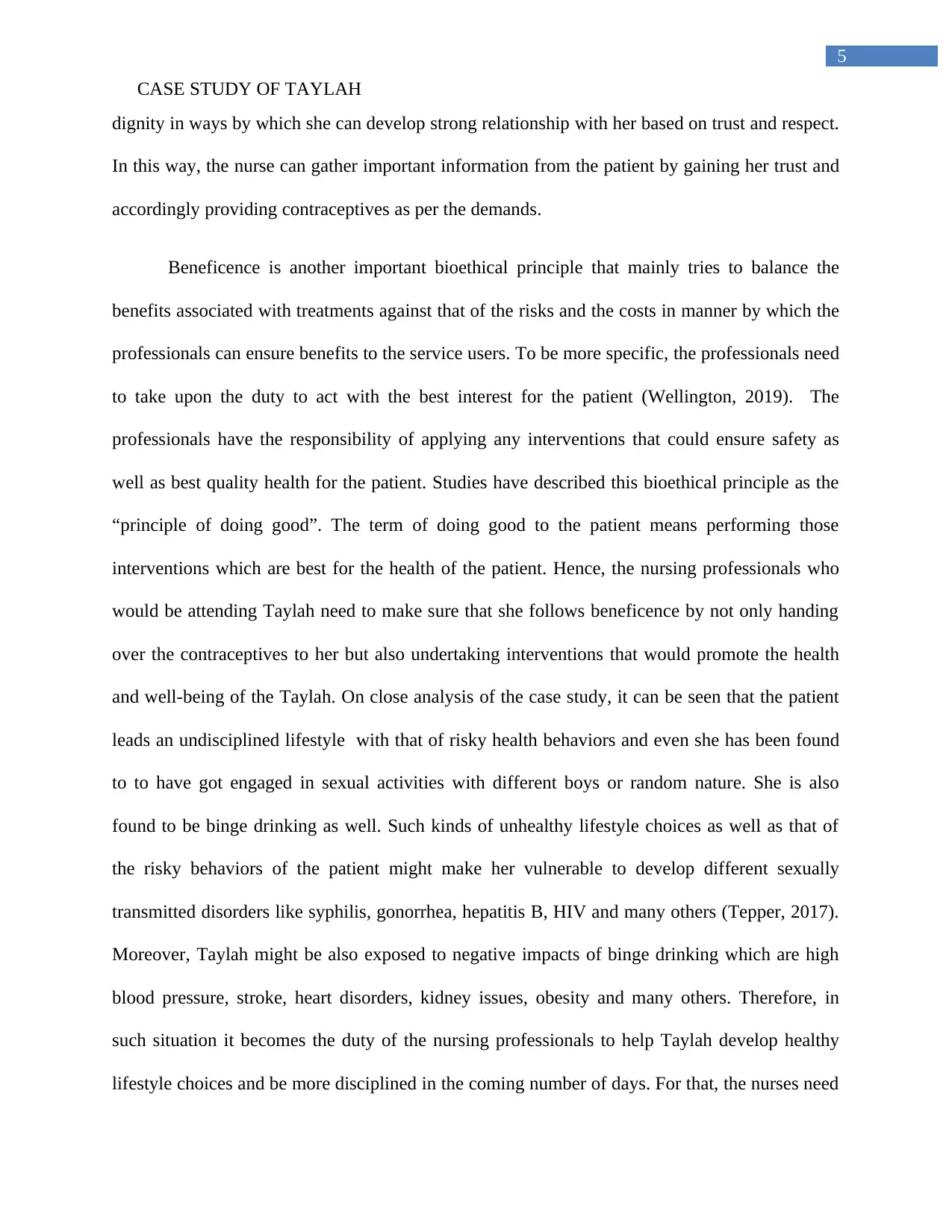
5
CASE STUDY OF TAYLAH
dignity in ways by which she can develop strong relationship with her based on trust and respect.
In this way, the nurse can gather important information from the patient by gaining her trust and
accordingly providing contraceptives as per the demands.
Beneficence is another important bioethical principle that mainly tries to balance the
benefits associated with treatments against that of the risks and the costs in manner by which the
professionals can ensure benefits to the service users. To be more specific, the professionals need
to take upon the duty to act with the best interest for the patient (Wellington, 2019). The
professionals have the responsibility of applying any interventions that could ensure safety as
well as best quality health for the patient. Studies have described this bioethical principle as the
“principle of doing good”. The term of doing good to the patient means performing those
interventions which are best for the health of the patient. Hence, the nursing professionals who
would be attending Taylah need to make sure that she follows beneficence by not only handing
over the contraceptives to her but also undertaking interventions that would promote the health
and well-being of the Taylah. On close analysis of the case study, it can be seen that the patient
leads an undisciplined lifestyle with that of risky health behaviors and even she has been found
to to have got engaged in sexual activities with different boys or random nature. She is also
found to be binge drinking as well. Such kinds of unhealthy lifestyle choices as well as that of
the risky behaviors of the patient might make her vulnerable to develop different sexually
transmitted disorders like syphilis, gonorrhea, hepatitis B, HIV and many others (Tepper, 2017).
Moreover, Taylah might be also exposed to negative impacts of binge drinking which are high
blood pressure, stroke, heart disorders, kidney issues, obesity and many others. Therefore, in
such situation it becomes the duty of the nursing professionals to help Taylah develop healthy
lifestyle choices and be more disciplined in the coming number of days. For that, the nurses need
CASE STUDY OF TAYLAH
dignity in ways by which she can develop strong relationship with her based on trust and respect.
In this way, the nurse can gather important information from the patient by gaining her trust and
accordingly providing contraceptives as per the demands.
Beneficence is another important bioethical principle that mainly tries to balance the
benefits associated with treatments against that of the risks and the costs in manner by which the
professionals can ensure benefits to the service users. To be more specific, the professionals need
to take upon the duty to act with the best interest for the patient (Wellington, 2019). The
professionals have the responsibility of applying any interventions that could ensure safety as
well as best quality health for the patient. Studies have described this bioethical principle as the
“principle of doing good”. The term of doing good to the patient means performing those
interventions which are best for the health of the patient. Hence, the nursing professionals who
would be attending Taylah need to make sure that she follows beneficence by not only handing
over the contraceptives to her but also undertaking interventions that would promote the health
and well-being of the Taylah. On close analysis of the case study, it can be seen that the patient
leads an undisciplined lifestyle with that of risky health behaviors and even she has been found
to to have got engaged in sexual activities with different boys or random nature. She is also
found to be binge drinking as well. Such kinds of unhealthy lifestyle choices as well as that of
the risky behaviors of the patient might make her vulnerable to develop different sexually
transmitted disorders like syphilis, gonorrhea, hepatitis B, HIV and many others (Tepper, 2017).
Moreover, Taylah might be also exposed to negative impacts of binge drinking which are high
blood pressure, stroke, heart disorders, kidney issues, obesity and many others. Therefore, in
such situation it becomes the duty of the nursing professionals to help Taylah develop healthy
lifestyle choices and be more disciplined in the coming number of days. For that, the nurses need
⊘ This is a preview!⊘
Do you want full access?
Subscribe today to unlock all pages.

Trusted by 1+ million students worldwide
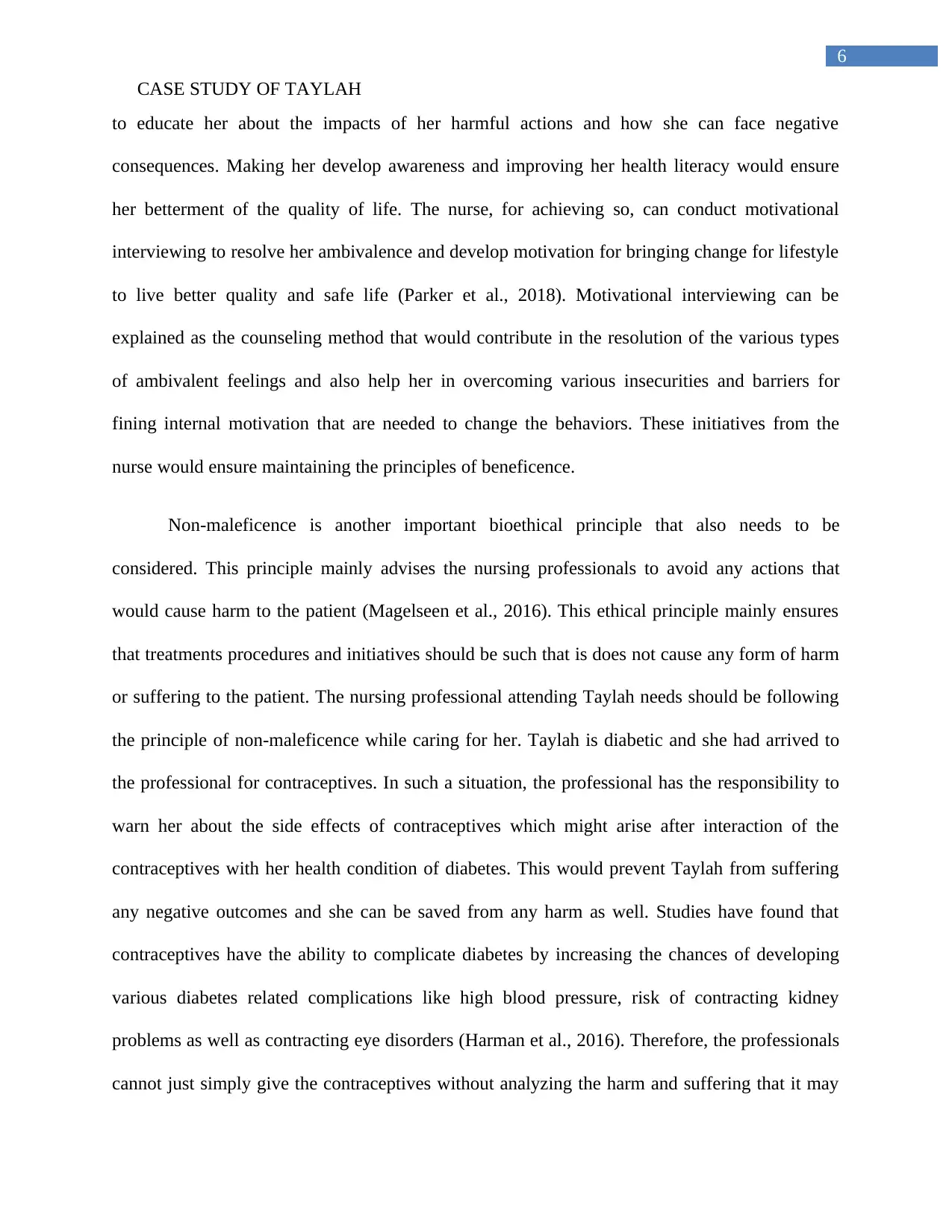
6
CASE STUDY OF TAYLAH
to educate her about the impacts of her harmful actions and how she can face negative
consequences. Making her develop awareness and improving her health literacy would ensure
her betterment of the quality of life. The nurse, for achieving so, can conduct motivational
interviewing to resolve her ambivalence and develop motivation for bringing change for lifestyle
to live better quality and safe life (Parker et al., 2018). Motivational interviewing can be
explained as the counseling method that would contribute in the resolution of the various types
of ambivalent feelings and also help her in overcoming various insecurities and barriers for
fining internal motivation that are needed to change the behaviors. These initiatives from the
nurse would ensure maintaining the principles of beneficence.
Non-maleficence is another important bioethical principle that also needs to be
considered. This principle mainly advises the nursing professionals to avoid any actions that
would cause harm to the patient (Magelseen et al., 2016). This ethical principle mainly ensures
that treatments procedures and initiatives should be such that is does not cause any form of harm
or suffering to the patient. The nursing professional attending Taylah needs should be following
the principle of non-maleficence while caring for her. Taylah is diabetic and she had arrived to
the professional for contraceptives. In such a situation, the professional has the responsibility to
warn her about the side effects of contraceptives which might arise after interaction of the
contraceptives with her health condition of diabetes. This would prevent Taylah from suffering
any negative outcomes and she can be saved from any harm as well. Studies have found that
contraceptives have the ability to complicate diabetes by increasing the chances of developing
various diabetes related complications like high blood pressure, risk of contracting kidney
problems as well as contracting eye disorders (Harman et al., 2016). Therefore, the professionals
cannot just simply give the contraceptives without analyzing the harm and suffering that it may
CASE STUDY OF TAYLAH
to educate her about the impacts of her harmful actions and how she can face negative
consequences. Making her develop awareness and improving her health literacy would ensure
her betterment of the quality of life. The nurse, for achieving so, can conduct motivational
interviewing to resolve her ambivalence and develop motivation for bringing change for lifestyle
to live better quality and safe life (Parker et al., 2018). Motivational interviewing can be
explained as the counseling method that would contribute in the resolution of the various types
of ambivalent feelings and also help her in overcoming various insecurities and barriers for
fining internal motivation that are needed to change the behaviors. These initiatives from the
nurse would ensure maintaining the principles of beneficence.
Non-maleficence is another important bioethical principle that also needs to be
considered. This principle mainly advises the nursing professionals to avoid any actions that
would cause harm to the patient (Magelseen et al., 2016). This ethical principle mainly ensures
that treatments procedures and initiatives should be such that is does not cause any form of harm
or suffering to the patient. The nursing professional attending Taylah needs should be following
the principle of non-maleficence while caring for her. Taylah is diabetic and she had arrived to
the professional for contraceptives. In such a situation, the professional has the responsibility to
warn her about the side effects of contraceptives which might arise after interaction of the
contraceptives with her health condition of diabetes. This would prevent Taylah from suffering
any negative outcomes and she can be saved from any harm as well. Studies have found that
contraceptives have the ability to complicate diabetes by increasing the chances of developing
various diabetes related complications like high blood pressure, risk of contracting kidney
problems as well as contracting eye disorders (Harman et al., 2016). Therefore, the professionals
cannot just simply give the contraceptives without analyzing the harm and suffering that it may
Paraphrase This Document
Need a fresh take? Get an instant paraphrase of this document with our AI Paraphraser
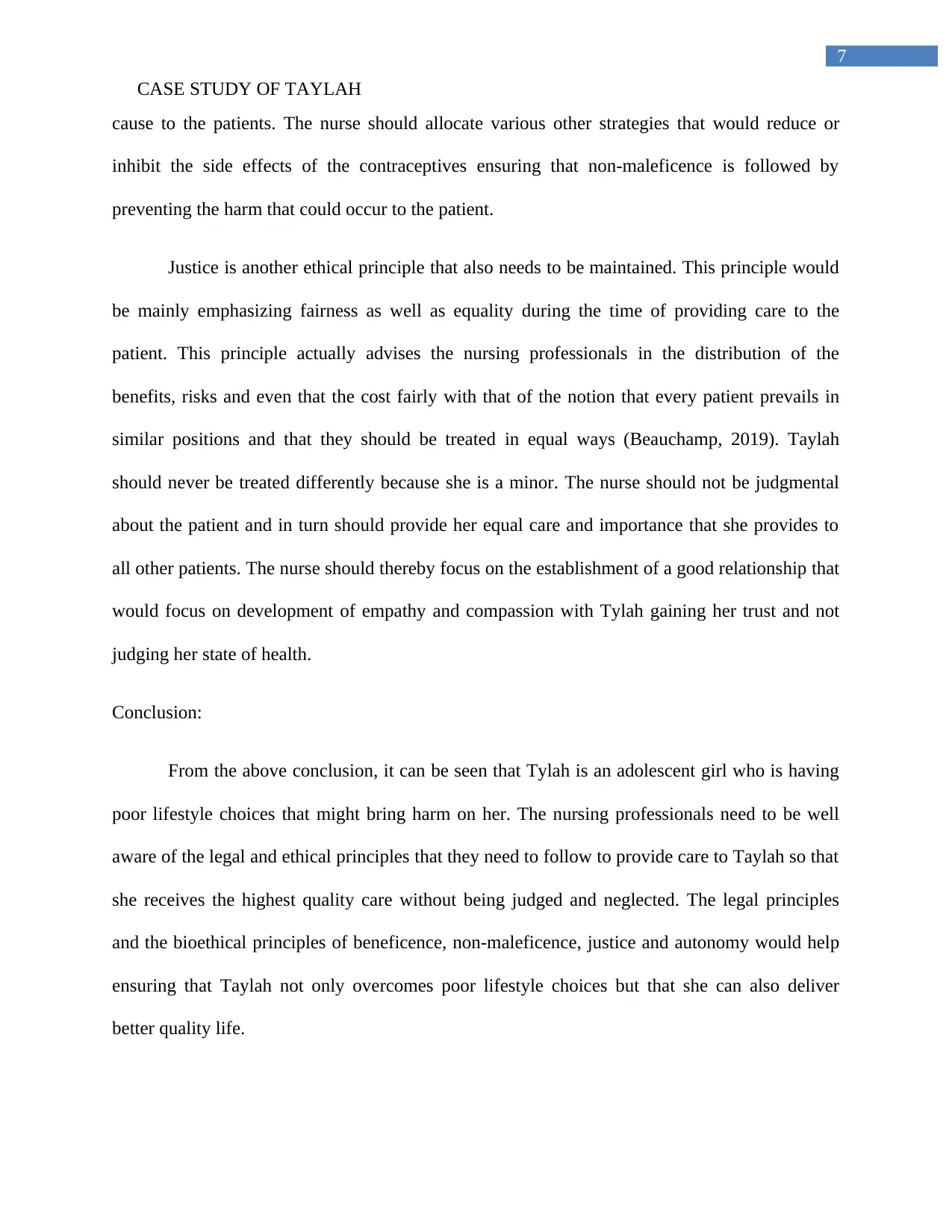
7
CASE STUDY OF TAYLAH
cause to the patients. The nurse should allocate various other strategies that would reduce or
inhibit the side effects of the contraceptives ensuring that non-maleficence is followed by
preventing the harm that could occur to the patient.
Justice is another ethical principle that also needs to be maintained. This principle would
be mainly emphasizing fairness as well as equality during the time of providing care to the
patient. This principle actually advises the nursing professionals in the distribution of the
benefits, risks and even that the cost fairly with that of the notion that every patient prevails in
similar positions and that they should be treated in equal ways (Beauchamp, 2019). Taylah
should never be treated differently because she is a minor. The nurse should not be judgmental
about the patient and in turn should provide her equal care and importance that she provides to
all other patients. The nurse should thereby focus on the establishment of a good relationship that
would focus on development of empathy and compassion with Tylah gaining her trust and not
judging her state of health.
Conclusion:
From the above conclusion, it can be seen that Tylah is an adolescent girl who is having
poor lifestyle choices that might bring harm on her. The nursing professionals need to be well
aware of the legal and ethical principles that they need to follow to provide care to Taylah so that
she receives the highest quality care without being judged and neglected. The legal principles
and the bioethical principles of beneficence, non-maleficence, justice and autonomy would help
ensuring that Taylah not only overcomes poor lifestyle choices but that she can also deliver
better quality life.
CASE STUDY OF TAYLAH
cause to the patients. The nurse should allocate various other strategies that would reduce or
inhibit the side effects of the contraceptives ensuring that non-maleficence is followed by
preventing the harm that could occur to the patient.
Justice is another ethical principle that also needs to be maintained. This principle would
be mainly emphasizing fairness as well as equality during the time of providing care to the
patient. This principle actually advises the nursing professionals in the distribution of the
benefits, risks and even that the cost fairly with that of the notion that every patient prevails in
similar positions and that they should be treated in equal ways (Beauchamp, 2019). Taylah
should never be treated differently because she is a minor. The nurse should not be judgmental
about the patient and in turn should provide her equal care and importance that she provides to
all other patients. The nurse should thereby focus on the establishment of a good relationship that
would focus on development of empathy and compassion with Tylah gaining her trust and not
judging her state of health.
Conclusion:
From the above conclusion, it can be seen that Tylah is an adolescent girl who is having
poor lifestyle choices that might bring harm on her. The nursing professionals need to be well
aware of the legal and ethical principles that they need to follow to provide care to Taylah so that
she receives the highest quality care without being judged and neglected. The legal principles
and the bioethical principles of beneficence, non-maleficence, justice and autonomy would help
ensuring that Taylah not only overcomes poor lifestyle choices but that she can also deliver
better quality life.
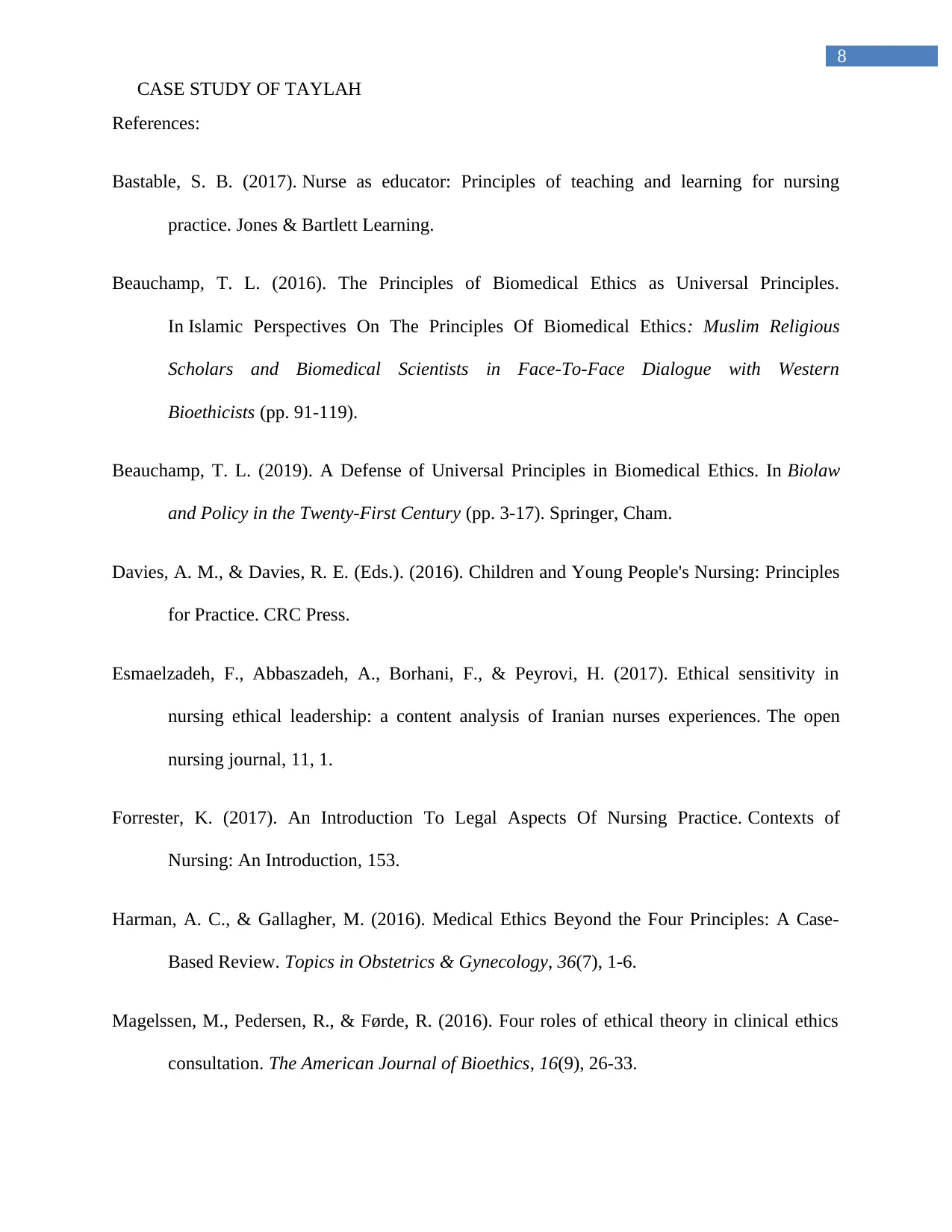
8
CASE STUDY OF TAYLAH
References:
Bastable, S. B. (2017). Nurse as educator: Principles of teaching and learning for nursing
practice. Jones & Bartlett Learning.
Beauchamp, T. L. (2016). The Principles of Biomedical Ethics as Universal Principles.
In Islamic Perspectives On The Principles Of Biomedical Ethics: Muslim Religious
Scholars and Biomedical Scientists in Face-To-Face Dialogue with Western
Bioethicists (pp. 91-119).
Beauchamp, T. L. (2019). A Defense of Universal Principles in Biomedical Ethics. In Biolaw
and Policy in the Twenty-First Century (pp. 3-17). Springer, Cham.
Davies, A. M., & Davies, R. E. (Eds.). (2016). Children and Young People's Nursing: Principles
for Practice. CRC Press.
Esmaelzadeh, F., Abbaszadeh, A., Borhani, F., & Peyrovi, H. (2017). Ethical sensitivity in
nursing ethical leadership: a content analysis of Iranian nurses experiences. The open
nursing journal, 11, 1.
Forrester, K. (2017). An Introduction To Legal Aspects Of Nursing Practice. Contexts of
Nursing: An Introduction, 153.
Harman, A. C., & Gallagher, M. (2016). Medical Ethics Beyond the Four Principles: A Case-
Based Review. Topics in Obstetrics & Gynecology, 36(7), 1-6.
Magelssen, M., Pedersen, R., & Førde, R. (2016). Four roles of ethical theory in clinical ethics
consultation. The American Journal of Bioethics, 16(9), 26-33.
CASE STUDY OF TAYLAH
References:
Bastable, S. B. (2017). Nurse as educator: Principles of teaching and learning for nursing
practice. Jones & Bartlett Learning.
Beauchamp, T. L. (2016). The Principles of Biomedical Ethics as Universal Principles.
In Islamic Perspectives On The Principles Of Biomedical Ethics: Muslim Religious
Scholars and Biomedical Scientists in Face-To-Face Dialogue with Western
Bioethicists (pp. 91-119).
Beauchamp, T. L. (2019). A Defense of Universal Principles in Biomedical Ethics. In Biolaw
and Policy in the Twenty-First Century (pp. 3-17). Springer, Cham.
Davies, A. M., & Davies, R. E. (Eds.). (2016). Children and Young People's Nursing: Principles
for Practice. CRC Press.
Esmaelzadeh, F., Abbaszadeh, A., Borhani, F., & Peyrovi, H. (2017). Ethical sensitivity in
nursing ethical leadership: a content analysis of Iranian nurses experiences. The open
nursing journal, 11, 1.
Forrester, K. (2017). An Introduction To Legal Aspects Of Nursing Practice. Contexts of
Nursing: An Introduction, 153.
Harman, A. C., & Gallagher, M. (2016). Medical Ethics Beyond the Four Principles: A Case-
Based Review. Topics in Obstetrics & Gynecology, 36(7), 1-6.
Magelssen, M., Pedersen, R., & Førde, R. (2016). Four roles of ethical theory in clinical ethics
consultation. The American Journal of Bioethics, 16(9), 26-33.
⊘ This is a preview!⊘
Do you want full access?
Subscribe today to unlock all pages.

Trusted by 1+ million students worldwide
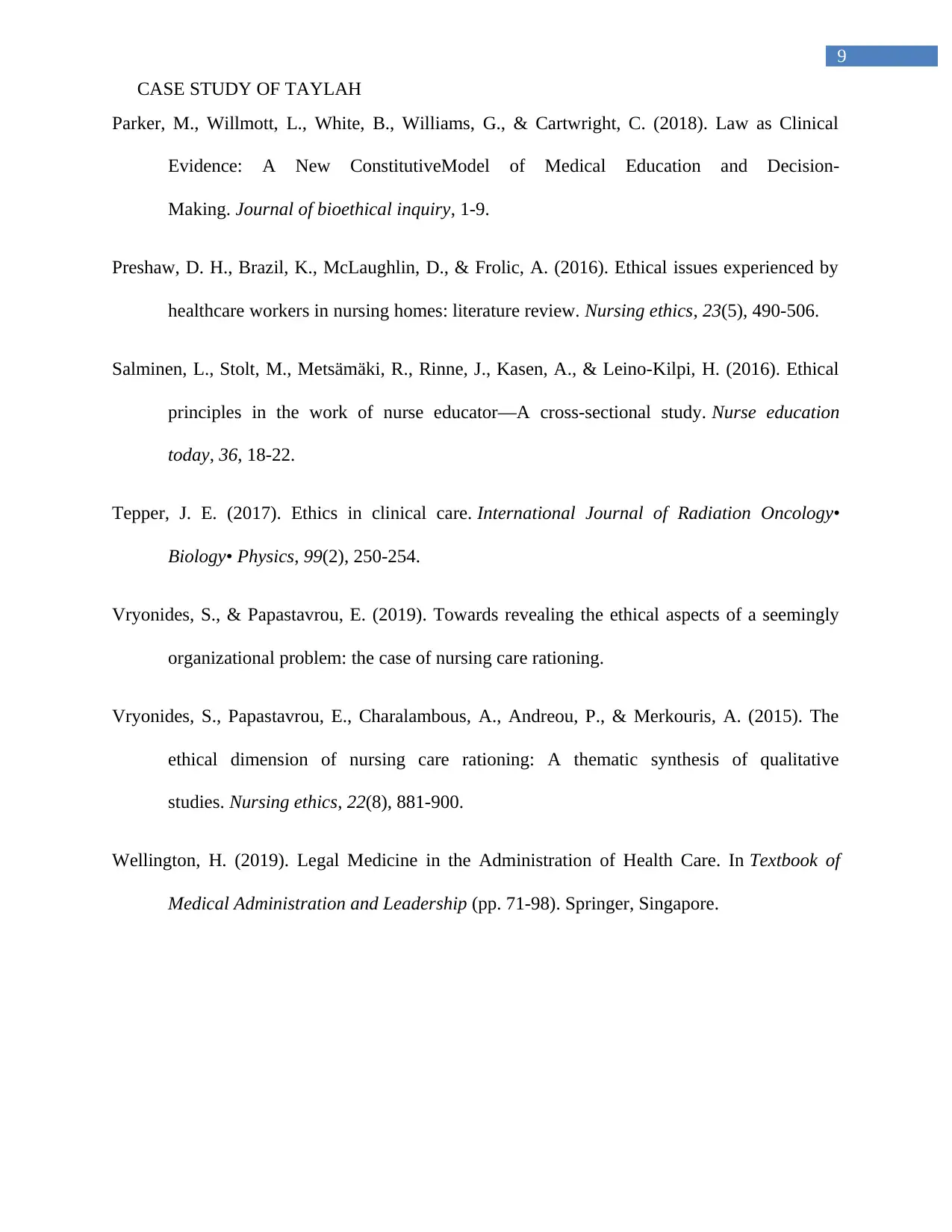
9
CASE STUDY OF TAYLAH
Parker, M., Willmott, L., White, B., Williams, G., & Cartwright, C. (2018). Law as Clinical
Evidence: A New ConstitutiveModel of Medical Education and Decision-
Making. Journal of bioethical inquiry, 1-9.
Preshaw, D. H., Brazil, K., McLaughlin, D., & Frolic, A. (2016). Ethical issues experienced by
healthcare workers in nursing homes: literature review. Nursing ethics, 23(5), 490-506.
Salminen, L., Stolt, M., Metsämäki, R., Rinne, J., Kasen, A., & Leino-Kilpi, H. (2016). Ethical
principles in the work of nurse educator—A cross-sectional study. Nurse education
today, 36, 18-22.
Tepper, J. E. (2017). Ethics in clinical care. International Journal of Radiation Oncology•
Biology• Physics, 99(2), 250-254.
Vryonides, S., & Papastavrou, E. (2019). Towards revealing the ethical aspects of a seemingly
organizational problem: the case of nursing care rationing.
Vryonides, S., Papastavrou, E., Charalambous, A., Andreou, P., & Merkouris, A. (2015). The
ethical dimension of nursing care rationing: A thematic synthesis of qualitative
studies. Nursing ethics, 22(8), 881-900.
Wellington, H. (2019). Legal Medicine in the Administration of Health Care. In Textbook of
Medical Administration and Leadership (pp. 71-98). Springer, Singapore.
CASE STUDY OF TAYLAH
Parker, M., Willmott, L., White, B., Williams, G., & Cartwright, C. (2018). Law as Clinical
Evidence: A New ConstitutiveModel of Medical Education and Decision-
Making. Journal of bioethical inquiry, 1-9.
Preshaw, D. H., Brazil, K., McLaughlin, D., & Frolic, A. (2016). Ethical issues experienced by
healthcare workers in nursing homes: literature review. Nursing ethics, 23(5), 490-506.
Salminen, L., Stolt, M., Metsämäki, R., Rinne, J., Kasen, A., & Leino-Kilpi, H. (2016). Ethical
principles in the work of nurse educator—A cross-sectional study. Nurse education
today, 36, 18-22.
Tepper, J. E. (2017). Ethics in clinical care. International Journal of Radiation Oncology•
Biology• Physics, 99(2), 250-254.
Vryonides, S., & Papastavrou, E. (2019). Towards revealing the ethical aspects of a seemingly
organizational problem: the case of nursing care rationing.
Vryonides, S., Papastavrou, E., Charalambous, A., Andreou, P., & Merkouris, A. (2015). The
ethical dimension of nursing care rationing: A thematic synthesis of qualitative
studies. Nursing ethics, 22(8), 881-900.
Wellington, H. (2019). Legal Medicine in the Administration of Health Care. In Textbook of
Medical Administration and Leadership (pp. 71-98). Springer, Singapore.
1 out of 10
Related Documents
Your All-in-One AI-Powered Toolkit for Academic Success.
+13062052269
info@desklib.com
Available 24*7 on WhatsApp / Email
![[object Object]](/_next/static/media/star-bottom.7253800d.svg)
Unlock your academic potential
Copyright © 2020–2026 A2Z Services. All Rights Reserved. Developed and managed by ZUCOL.





